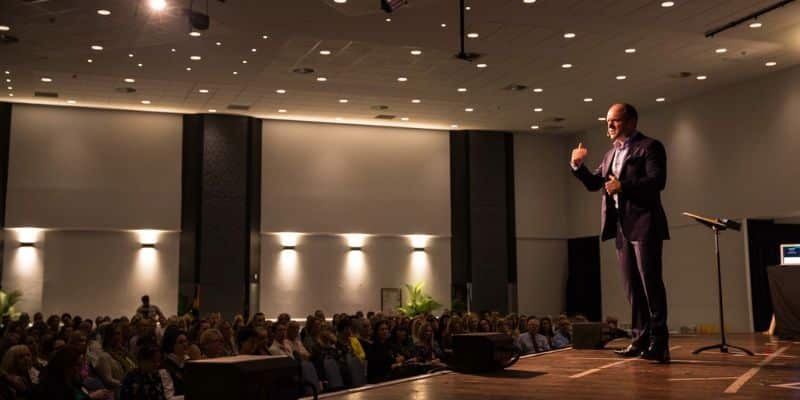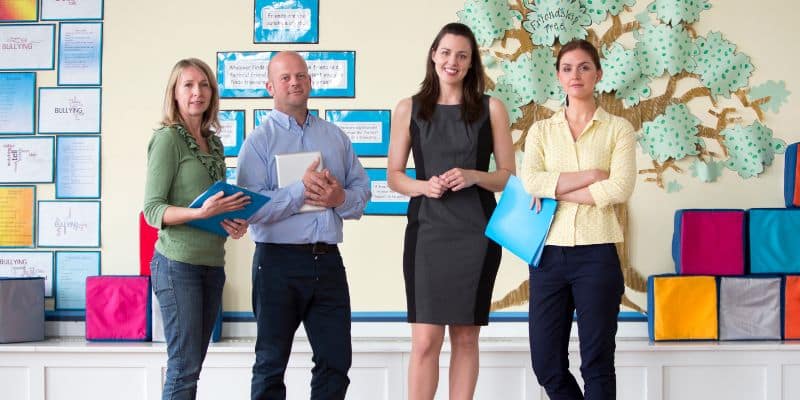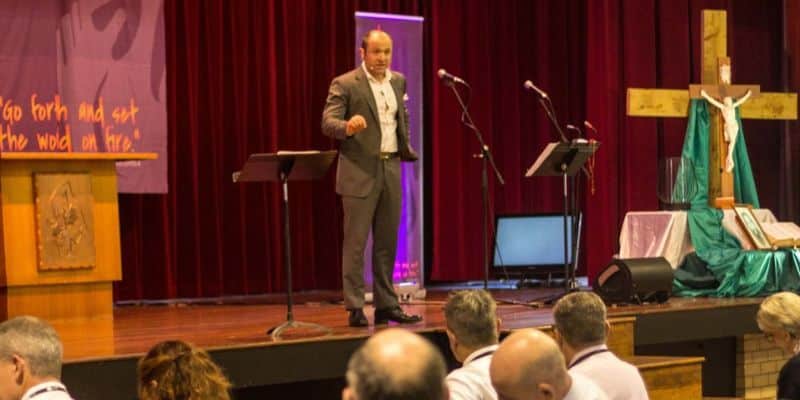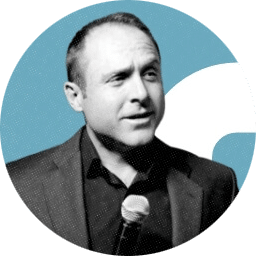Welcome to the Catholic Teacher Daily Podcast, where Jonathan Doyle shares insights and inspiration for Catholic educators, principals, and leaders alike. Whether you’re a teacher, principal, bishop, or even the Supreme Pontiff, this podcast is for you. Jonathan’s passion for supporting Catholic educators shines through as he delves into topics like telos and teleology in Catholic education, reminding us of the purpose behind our vocation. Join Jonathan as he explores the rich tradition of Catholic anthropology, the role of Catholic education in shaping virtuous individuals, and the enduring truth of our ultimate telos. So, tune in, subscribe, and embark on this journey of faith, education, and transformation.
Welcome Aboard: Joining the Catholic Teacher Community

Hello there. My friend, Jonathan Doyle, is with you once again. You are officially welcome to the Catholic Teacher Daily Podcast. You’re welcome, because I just love having the chance to talk with you and share some time with you. And because you are a Catholic teacher, a Catholic principal, or a Catholic bishop, as I said last week, you could be the supreme pontiff. I am humbled. Thank you for stopping in your holiness, but whoever you are today, welcome aboard.
Please make sure you’ve subscribed. Hit the subscribe button on your phone. Wherever you’re listening, whether you listen to every episode or not, it does help the algorithm and it just means that some Catholic teachers out there are feeling defeated, unsure, burned out, and exhausted. They know that somewhere out there, there must be a Catholic podcast. And if you’ve subscribed or left a comment, they have a much better chance of finding it. So please do that for me.
I’m going to speak next week. I’m going to be working with a fantastic Catholic diocese. I will be training all their leaders over four days across their entire education system on virtue-based leadership. If you want to follow that adventure, jump on Instagram right now and go to @jdoylespeaks. Just type in jdoylespeaks, and that is going to take you on the adventure with me. I’m going to post a lot of stuff there. You can follow along.
I think my plan is on Monday. I haven’t asked the director of education this yet, but I’m off stage at 11. I’m planning to run back to the hotel, get changed, and I’m going to run up this incredible mountain that’s in this particular city and it’s 2000 meters of climbing. So two kilometers of vertical climbing and it’s a 25K return run. As regular listeners know I’ve got an ultramarathon that I’m running, coming up on the 4th of May. So even when I’m flying and traveling, I still have to get those Ks in. If you would like to see me, running up a ridiculously large mountain. Then please go check out Instagram.
Telos and Teleology in Catholic Education

I want to share something with you today. I’ve been working all day on these presentations for next week. I wanted to talk to you a little bit about telos, which is something that I often speak to leaders about. Telos leads to the field of study called teleology. I want you to stay with me on this because it’s important for you and for your students.
So much of the work that I do in teacher formation, Catholic teacher formation, Catholic teachers, staff, and professional development is based on a Catholic anthropology of the human person. So I’ve been saying for many years on stage that you can never say what a person should do until you can say what a person is.
Sometimes I demonstrate it by saying that if you hold a hammer in your hand. The look and feel of that, it’s obviously got a particular set of functions. It would be no good for performing fine surgery, it would be no good for mixing cocktails. Pick your example, friends, or whatever you like. And that leads us to the idea that function follows form, which means what something does is related to what it is.
This brings us to the telos that it really comes from Plato and Aristotle. But it’s this idea that each particular kind of thing has a particular end or purpose. So what is the purpose of a tree? It is to grow; it has these other functions, it provides shelter, it does these different things; but it’s fundamental function, its final end is growth. Sometimes I’ll show this little acorn on stage, and then I’ll show a massive oak tree. And I say the telos, the final end of this acorn is to become a tree. The final telos of the tree is to grow, to become fully what it can possibly be given its environment.
Rooting Education in Catholic Anthropology

So when I talk to Catholic educators, I talk about this because we need to remind ourselves that the human person is a particular kind of thing. And I take people through the vast sweep of the last sort of thousand years of history and we look at these different ideologies, I talk about Jacques Rousseau, I talk about Descartes, I talk about Marx, Nietzsche and Freud. I talk about these different forces that have tried to shape our understanding of what it means to be human.
This, my friend, is why I’m so passionate about Catholic education, because I think we have the best story to tell. What is that story? It is the story of creation, it is the story of us being created from nothing other than the love of God, in his own image and likeness. Now if that’s true, what is that telos of the person? The final end of the human person, according to the catechism is beatitude, eternal beatitude in the presence of God. To literally be exactly where we have always been meant to be, back in the house of the father.
So the end of a person, the telos of what it means to be human, is that we are the kind of thing that is designed for worship—we’re designed for holiness—we’re designed for communio personarum, we are designed for relationships, connection, and love.
Fulfilling the Mission of Catholic Education

So what this means for Catholic education is that it leads us to meditate on the virtues of prudence, justice, temperance, and fortitude. Help us with their practical ways in which we are able to approximate, go-after, chase our potential, telos.
If you think about the very active Catholic education itself, what a Catholic teacher is doing is helping young people discover that same great truth that they are made in God’s image. What’s the telos of a young person, It’s to grow; it’s to learn, it’s to be formed in the image and knowledge of God.
I just wanted to remind you that we do not live in the world that the postmoderns have constructed for us. The church has stood for 2000 years worth of really bad ideologies and philosophies, and she is still here. She has outlasted gnosticism, she has outlasted all forms of paganism and cultism, she has outlasted Marxism, she will outlast postmodernism, she will outlast wokeism, she will outlast them all. Because she has been entrusted with the truth of the value and dignity of the human person made in the image and likeness of God.
Empowering Catholic Teachers as Stewards of Truth

You, my friend as a Catholic teacher, both a herald and a custodian, a steward of those truths. So as you walk into your classroom, what you’re actually doing is participating with God. In Latin, we have this term: particips creatoris, co-creators God has entrusted you with the co-building of his kingdom. One of the ways we really need to think about this is to look at our students and think of the telos. What is the end of this person?
Do you understand that the students sitting in front of you, even the most difficult ones, sometimes, especially the most difficult ones. Each of those young people has been created by almighty God for communion with him and eternal happiness in heaven. The devil wants to steal that away. So you have to keep seeing your students through the lens of the telos, heading somewhere as destined for somewhere. And that somewhere is the Father’s house and everything that you can do to help them move towards that is totally precious and worthwhile.
Marx’s was wrong, Nietzsche was wrong, Freud was wrong. I’ll be teaching about that all next week. And do you know who was right? The apostles, the fathers of the church, the great saints, men and women throughout the ages, the magisterium. They were right because they were entrusted with the truth of the telos. They were entrusted with the truth of what the person is, why they were created and their eternal destiny. Isn’t this amazing stuff that we hold?
Stay Connected and Engage with Catholic Education
I know that in your busy day-to-day life, it’s so easy to lose track of this, but let’s just pray for fresh eyes. Let’s pray for grace from the Spirit. To walk back into the classroom with fresh eyes and see as the father sees, to believe that these young people are destined for so much. What an incredible thing it is that you do.
God bless you. My friend. Please make sure you’re subscribed. If you want to book me to come and speak, my schedule is heavy, but definitely, I’m going to be doing a lot of stuff in the next few months on teacher burnout and resilience. So if you would like me to come and work with your staff, on both practical strategies for dealing with burnout, exhaustion, wellbeing, and resilience. As well as a spiritual lens to do with that, because I think it’s one thing to build practical tools, but without the spiritual lens it’s difficult to manage the intensity of modern teaching.
So I’m doing seminars. All over the world at the moment. So that could be a blessing to your school community and your diocese. Please go and visit the website: jonathandoyle.co. And just make time to speak with me or one of the team and we’ll see if we can get me out there to try and encourage your staff community.
All right. And remember, next week, Instagram at @jdoylespeaks. Pray for me, friends, as I run up this mountain. Don’t tell Karen, she doesn’t know yet. She’s like, I kept trying to ring you. You didn’t answer. Oh, no reason. It’s just running up a massive hill in the rain. God bless everybody.
My name is Jonathan Doyle. This has been the Catholic Teacher Daily Podcast. You and I are going to talk again tomorrow.




